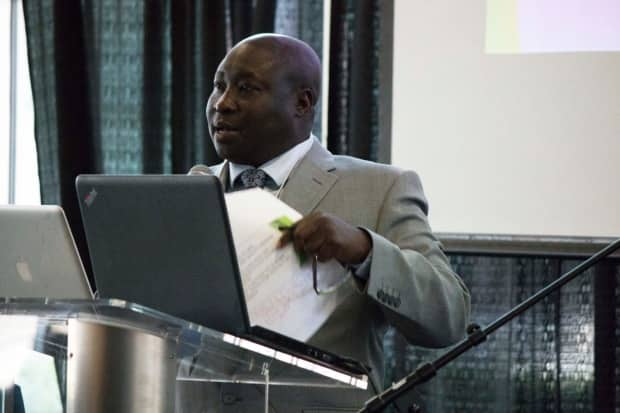Edmontonian immigrants haunted by horrors they fled

When the calls come from cash-strapped loved ones in war-torn Syria, Edmontonian Mohamad Mawed and his Canadian relatives band together to send what money they can.
But for refugee families trying to eke out a new life in Canada, there is little to spare.
"When people ask you for help, sometimes you cannot because you don't have ability," said Mawed, a settlement worker, who came to Canada in 2014.
"This will be our heart breaking."
It's a similar story for countless Edmontonians anxious about the plight of family members worldwide facing hunger, poverty, disease, conflict, disaster, political upheaval and human rights abuses.
Despite finding a safe haven in Canada, devastating events unfolding in their country of origin still take a psychological and financial toll.
According to Dr. Karin Linschoten, clinical director for counselling services at the Edmonton Mennonite Centre for Newcomers (EMCN), roughly 30 percent of Edmontonians are refugees or immigrants, potentially impacted by hardship overseas.
She says the result can be aggravated symptoms of post-traumatic stress disorder or sleepless nights fearing for loved ones amid frantic calls to check on their wellbeing.
"That immediately affects their stress level, their mental health level, and it immediately affects their functioning," Linschoten said.
She noted that problems often persist years after a war has officially ended and faded from the headlines, for instance in Afghanistan.
"So the impact it has on the people here is also still happening, even if we don't hear anything about it," Linschoten said.
Two months to access therapy
But with more people seeking counselling since the beginning of the pandemic, it's harder to access support. Wait times at EMCN have shot up from four weeks to more than two months.
"Which is terrible — I have no other word for it, because people need support," said Linschoten. "Many communities have associations and they are really good support for each other ... It would be good if these associations would themselves get more support so they can more easily organize these things."
The burden has only worsened as poverty increases in households throughout Edmonton because of COVID-19.
At EMCN, Joseph Luri oversees programs for youth and families with roots in countries such as South Sudan, Sudan, Somalia and Democratic Republic of Congo where relatives and friends have been displaced by conflict.
"You can see that your people are suffering, you can see that there is a need when you receive those phone calls," Luri said.
"But there is nothing much one can do because so many of the community members have either been laid off from their jobs or they have had their hours cut. And so it becomes really difficult. It has resulted in a lot of mental health challenges."
'I feel a lot of guilt living here'
The impact of overseas disasters is not just felt by first-generation Canadian immigrants.
After the Ethiopian government launched a military offensive against leaders in the northern region of Tigray last November, Edmonton-born Giyona Tiku couldn't look away.
"All day, from the moment I wake up to the moment I go to sleep, this is what I think about while struggling to focus on work and school in between," said Tiku, 29, about the region where she has made many trips to visit aunts, uncles and cousins.
"I've had family members who have moved to the capital during this time and young men who when soldiers approached their hometowns, who fled into the mountains, who hid in remote caves."
Often unable to reach loved ones, Tiku monitors the unfolding humanitarian disaster that has reportedly displaced and cut off millions from food and healthcare as reports emerge of mass killings, gang rape, and other human rights violations by pro-government forces.
On Saturday, U.S. authorities called for the atrocities to be independently investigated, urging the Ethiopian government to end hostilities and troops from neighbouring Eritrea to withdraw.
Tiku wants the Canadian government to take a similar stance.
"I don't know how horrible the experience of my family has been throughout this time," said Tiku. "I feel a lot of guilt living here. I can't even describe the level of helplessness, like we see how horrible this situation is and all we can do is try to get people to hear us and hope that they can do something about it."

